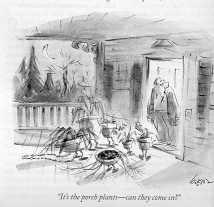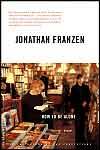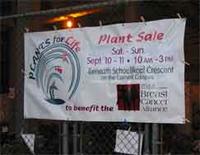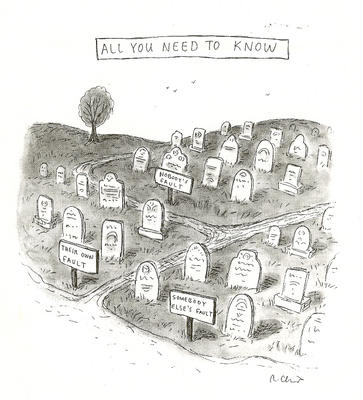Friday, September 30, 2005
Energy Use
Technology
But I've just discovered the min/max feature of my electronic thermometer. My house has no north-facing windows. It's been challenging to place an outdoor thermometer where I can see it but it's not affected too much by the sun. Last Christmas I received this electronic thermometer with a remote sensor (and a clock continually updated by the national atomic clock!) So, I put the remote sensor in the shade of the north side of the house and - voila - I've got a good idea what the outside temperature is.
 It also records the minimum and maximum temperatures. If I reset it at regular intervals I guess I could know the daily minimum and maximum temperatures. I don't need to know that everyday. But last night someone at the Dryden Democrats meeting said a hard frost was forecast. Damn! My houseplants are still outside. I had reset the min/max setting last week when I discovered it. So, checking this morning, I see that the lowest temperature since then was 41. And porch plants are happily safe.
It also records the minimum and maximum temperatures. If I reset it at regular intervals I guess I could know the daily minimum and maximum temperatures. I don't need to know that everyday. But last night someone at the Dryden Democrats meeting said a hard frost was forecast. Damn! My houseplants are still outside. I had reset the min/max setting last week when I discovered it. So, checking this morning, I see that the lowest temperature since then was 41. And porch plants are happily safe.
Tuesday, September 27, 2005
We love math
Arghhhh! How did I forget to watch The West Wing Sunday night? Damn. And how did I forget that my sun roof was open when it rained - twice!? And how did I forget that my credit card payment was due day before yesterday? Damn. Some days my life just gets out of control. But I can divide 1/4 by 2/3 and I can enjoy reading about it. Life is good.
Monday, September 26, 2005
Pretty good news
Tiny energy tip
Anyway, it turns out coffee made with cold water is good - and easy. Draw your own conclusions.
Sunday, September 25, 2005
Web Search - Gerin Oil
You have to read it to appreciate it. But in case you don't have time, the gist is this: Gerin Oil (or Geriniol) is a powerful, addictive, widely used drug which induces delusions leading to things like the 9/11 hijackings and the Salem witch trials and most of Europe's wars in the Middle Ages. Do I have your attention yet? Are you wondering, as I did, why you've never heard of it?
My Google search for Geriniol led only to quotes from Dawkins article but Google suggested I might have meant Geraniol. It's hard to imagine Dawkins making that kind of spelling error, but I took the bait and read several interesting articles about Geraniol, a natural essential oil found in thyme, hops, beebalm and other herbs and widely used in perfume and aromatherapy. Incidentally, did you know there a section of SciWeb where you can find abstracts of chemical and medical patent applications?
However, I was on the wrong track. I switched to searching for Gerin Oil. Check it for yourself if you've got time for a laugh. But it turns out that Gerin Oil and Geriniol are anagrams for religion. Now go back and read the Dawkins article, "Opiate of the Masses."
Wednesday, September 21, 2005
Liberal Liberty?
The first link under Env-Blogroll is A Better Earth. Okay, I should have been clued in by the subtitle "alternative approaches to environmental concerns." Perhaps even more so by the acknowledgement at the bottom of the page:
But I was sidetracked by the link near the bottom of the left-hand sidebar to the "Bunny Game." It's been a while since I've played an online game and I thought maybe this would be educational. And it was - though not so much in the way it was intended."aBetterEarth.Org is a project of the Institute for Humane Studies at George Mason University, a non-profit educational organization that promotes innovative thinking about how we can achieve a world that is peaceful, prosperous and free."
The game "tragedy of the bunnies" demonstrates (in the "public" version) that 30 bunnies are wiped out almost immediately by the greed of the three stakeholders. The "private" version goes on to demonstrate that if each of the three stakeholders is given ownership of 10 bunnies the population can be sustained - much to the advantage of everyone. The game went on to explain to me "The Tragedy of the Commons"
" ... a well-known phenomenon to environmentalists and economists. The phrase itself was penned by Garrett Hardin in his seminal 1968 article, "The Tragedy of the Commons."
As any economist will tell you, people respond to incentives. If there's a valuable resource lying about in a commons (picture a pizza at a frat party) people will try and grab as much of that resource as they can before the resource is depleted. This response is natural; it's an example of people responding to incentives. In other words, in a zero-sum game, you need to "get while the getting is good". The more other people get, the less there is for you.
Even if the resource is renewable (like a forest or an elephant population) the situation can turn into a zero-sum game. This is because while it may be in the community's interest to refrain from depleting the resource, it's still in each individual's interest to "get while the getting is good." Tragically, the very people who do act in the long-term public interest and refrain from depleting the resource end up getting nothing. Even more tragically, when a renewable resource is utterly depleted, no one benefits over the long-term. This is the tragedy of the commons."
Astonished by the one-sidedness of this explanation I followed a sponsor link to Institute for Humane Studies (I hesitate to provide links to all these places - suffice it to say the subtitle of this site is "Explore the ideas of Liberty...") and from there to LibertyGuide.com. (by now I'm getting the hang of interpreting sites with "Liberty" in the title) and from there to this article referring to "the tragedy of the commons."
Hmm... the author is a professor at Berkeley. Let's see if there's any connection to Brad DeLong. I search the site for Brad DeLong and get 167 hits, all of which, apparently, are about how wrong he is. Wouldn't I love to be a fly on the wall at those faculty meetings.
All this led me to a long investigation of the meanings of liberal and conservative (more on that tomorrow). And another in a long line of fruitless efforts to substantiate my sense that Democrats are smarter than Republicans. The only shred of evidence I've ever turned up is the oft-repeated data from the National Opinion Research Center at University of Chicago, General Social Survey, which shows Republicans have about half a year more formal education. Yet the fear of universities as dens of liberal iniquity persists. I'm confused.
Tuesday, September 20, 2005
Reading
 In How To Be Alone, Jonathan Franzen includes the insightful essay, "Imperial Bedroom" addressing the issue of "Privacy, privacy, the new American obsession..." Franzen describes privacy as a kind of two-way street. There's the conventional mode of your own private information being made public - dangerous when a stranger gains your credit card information or embarrassing when people you know see you going into a sex toy store. And there's the opposite intrusion when other people's private actions are thrust in your face - like the salacious details of Clinton's indiscretion in the Times at your breakfast table or the construction worker peeing on the sidewalk.
In How To Be Alone, Jonathan Franzen includes the insightful essay, "Imperial Bedroom" addressing the issue of "Privacy, privacy, the new American obsession..." Franzen describes privacy as a kind of two-way street. There's the conventional mode of your own private information being made public - dangerous when a stranger gains your credit card information or embarrassing when people you know see you going into a sex toy store. And there's the opposite intrusion when other people's private actions are thrust in your face - like the salacious details of Clinton's indiscretion in the Times at your breakfast table or the construction worker peeing on the sidewalk.I'm grappling with the distinction between privacy and anonymity. Franzen describes the 19th century small town where everyone knew each other and observed every movement of each neighbor. I grew up in a 20th century town almost like that. Compare that to Wegman's tracking my shopping habits. They know my every grocery purchase for the last 15 years. But they don't know me, so I don't really care. It's a far cry from the corner druggist, whom I'd see at church on Sunday, knowing I was buying condoms - not that that could have happened when I was a teenager in this small catholic town in the sixties.
But we all deal with privacy and anonymity on the internet. I feel fairly private at home. I live alone. I don't always lock the doors. I don't always close the drapes (details I probably shouldn't reveal). Still, at home I feel comfortable doing pretty much as I like. But I know that a hundred yards away, on the road, I should have clothes on and I should probably refrain from singing and dancing. I know there are things I can say and do in private that would be too much trouble to deal with in public.
Under the heading of "caring what other people think," I used to teach my kids that if they're doing something that they'd have to lie about if questioned, they should examine the possibility that they're doing something wrong. I still think it's a good rule. Ask yourself, "Could I stand up in public and defend this action?"
"Online privacy?" Isn't that an oxymoron? Don't we all know, by now, that the internet is public? There's a certain risk in revealing private information online - whether it's your encrypted credit card account number or the blog details of why you hate your boss. As Franzen points out, "When Americans do genuinely sacrifice privacy... they do so for tangible gains in health or safety or efficiency. " For example, airport security and department store surveillance cameras.
Still, in some areas, like heath and legal records, I understand why privacy is important. There's still a great deal of prejudice against people with certain health problems or arrest records. And there are plenty of things that are simply no one else's business.
P.S. I like that spellcheck wants to make "Wegman's" either hegemonic or awesomeness.
Monday, September 19, 2005
Energy usage
Soon I'll look at less packaging and local food. Then I'll move on to things in the community.
Birds
Sunday, September 18, 2005
Garden


 One of the joys of living in one place for a long time is that eventually the gardens pay off. There are lots of Colchicums blooming in my garden right now.
One of the joys of living in one place for a long time is that eventually the gardens pay off. There are lots of Colchicums blooming in my garden right now.And this worked out pretty well in the "Blue and White" garden.
For the record, the morning glories grew in the shade of a black walnut tree - hardly ideal. And with fairly diligent application of deer repellant the 'Casa Blanca' lilies did well.
The Plants for Life sale went well last weekend. Here we are setting up. Truckloads of beautifully grown plants.
Couldn't resist buying some things. Then Sunday, when I went back to help clean up, volunteers were encouraged to take home certain kinds of plants that will not be grown on for next year. I can't believe I ended up with 76 shrubs and perennials, including the ones I bought. I've been all week trying to get them planted. About 15 to go and I need to remove some sod to make room for them.
Saturday, September 17, 2005
Priorities
This blog has been pretty random. My environmental interest doesn't show up when I'm also involved in learning more about economics, philosophy, politics, photography, gardening, etc., etc.
This morning I've been pursuing the elusive perfect environmental site. What I usually want to know is "What shall I do next?" and "Why?" I already reduce, reuse, recycle, compost, own a high mileage car, keep my thermostat low in winter and more. So, superficial conservation tips aren't very helpful. But I've found a few sites that I plan to keep an eye on.
For news and links: Gristmill, Alternative Energy, Triplepundit.
Two sites stand out. Enviropundit, for good writing and design. And Environment Economics for a "stand back and look at the big picture" perspective.
Friday, September 16, 2005
Constitution
- How many states must ratify an amendment? (majority, 2/3, 3/4 or all)
- Which state first ratified the constitution?
- Who was the first Vice President?
- Which right is guaranteed to a person accused of a crime? (1. to hear witnesses against him, to have any judge he chooses, to change the location of the trial, another choice I can't remember)
It's discouraging how many callers are answering wrong. One caller made an interesting point. On this topic there's none of the usual vitriolic arguing among callers. Everyone likes the constitution - which is amazing considering how little callers seem to know about it.
Some of the questions on C-SPAN are the same as this quiz on the Whitehouse Kids page. There's also this Constitutional Timeline at the National Constitution Center. Very cool site. Check it out. Do it now. There will be a quiz tomorrow.
Sunday, September 11, 2005
Reading

 I wish there were an easier way to update the sidebar. I imagine there is. But for now I'm stuck with editing the template which I don't enjoy so I don't do it very often. Still, these two books are worth noting. Things Fall Apart is my bookclub's current choice and the community reading project for Cornell and Ithaca. Birdsong, by Don Stap, is a great study of "our enduring fascination with birdsong, from ancient pictographs and early Greek soothsayers, who knew that bird calls represented the voices of the gods, to the story of Mozart's pet starling." (from the dustcover)
I wish there were an easier way to update the sidebar. I imagine there is. But for now I'm stuck with editing the template which I don't enjoy so I don't do it very often. Still, these two books are worth noting. Things Fall Apart is my bookclub's current choice and the community reading project for Cornell and Ithaca. Birdsong, by Don Stap, is a great study of "our enduring fascination with birdsong, from ancient pictographs and early Greek soothsayers, who knew that bird calls represented the voices of the gods, to the story of Mozart's pet starling." (from the dustcover)
Saturday, September 10, 2005
Colin Gebelein
Thursday, September 08, 2005
Could have, should have
I'm kind of bored by the "They didn't do all they could have" ranting. The fact remains they didn't do what they should have. They didn't have the skill, ability, information, will or priorities to do what should have been done. And then let's drop the we/they dichotomy. Tho' some of us were trying harder than others, we all failed.
It reminds me of the dreaded report card day when your mother (or in some cases your father) says, "Well, that B is good but why didn't you get an A?" Does anyone ever think, while you're partying, that someday someone's life will depend on what you might have learned in the class you're going to miss in the morning?
Pop psychology has been telling us not to burden ourselves with "should". I should lose five pounds but I can't or it's too hard or I'd rather go to the movies. I should vote but I'm too busy or it doesn't really make a difference or I'd rather go to the movies. I know my kids hated it when I always expected a little more. And they were (are) great kids who accomplished a lot. But yes, I always hope for a little more. And I hope for it in myself, too.
I deal with the "shoulds" on my to do list by trying to force them into either the "want to" or "have to" categories. Either way the problem is short-sightedness vs. taking the long view. I rarely actually want to wash the dishes (unless I'm doing to avoid doing something else I like less.) But tomorrow I'm going to want the kitchen counter to be clean.
So, right now I should go clean up so I can take Bill to the library. Here I go... See me going...
Tuesday, September 06, 2005
Voyage of the Beagle
It may be said there exists no limit to the blindness of interest and selfish habit. I may mention one very trifling anecdote which at the time struck me more forcibly than any story of cruelty. I was crossing a ferry with a negro, who was uncommonly stupid. In endeavouring to make him understand, I talked loud, and made signs, in doing which I passed my hand near his face. He, I suppose, thought I was in a passion, and was going to strike him; for instantly, with a frightened look and half-shut eyes, he dropped his hands. I shall never forget my feelings of surprise, disgust , and shame, at seeing a great powerful man afraid even to ward off a blow, directed, as he thought, at his face. This man had been trained to a degradation lower than the slavery of the most helpless animal.
Monday, September 05, 2005
All you need to know

I've started several posts in the past few days and thrown up my hands. I've reacted to blogs I read with either "Oh, no. Not more of that." or "How could you be writing something so trivial today?" So, I'm moving on.
My daughter found this cartoon shortly after the death of my son.
Correction 9-16-05. Belinda originally found this in the New Yorker. Maggy has actually never seen it.
Thursday, September 01, 2005
News
Rebecca interviews Heather Armstrong of Dooce on blogging. In response to "How has your site changed over the years?" Armstrong says:
I was aware of the public nature of blogger even when I started this blog and had no readers. But as my life becomes even more public, I find myself being more careful of what I say. I used to teach my kids to be prepared to prepared to justify their decision out loud. If you find yourself feeling like you have to lie about something, maybe there's something wrong with it."I started out thinking that I could say anything in my space and that everyone else needed to get over it, including my family and friends. Of course, I ended up alienating my family and losing my job and pissing off my friends, and it took WAY TOO LONG for me to figure out that while there is great power in personal publishing, there is also great danger."
I recently gave this blog address to a twelve year old friend whose parents are cautious about her internet use. Now I'm mindful that she and her parents may be among my readers. And I'm not worried.
That said, I'll remind you that investing in a city below sea level is not really a good idea. Don't city planners ever play Sim City? I'm more worried than ever about my daughter in New York - whose office building had a bomb scare this morning. And I'm rethinking my emergency plans with emphasis on supplies in my car - tho' I can't imagine being in my car in an emergency unless I was on my way to or from New York.
Seems like a lot of what I see on the news has been covered already on The West Wing. I never see Scott McClellan without wishing he were CJ. Wouldn't you want a press secretary to have - well - some public speaking ability? Still, McClellan did better than usual today. I particularly enjoyed his reference to Bush's statement that "We won't tolerate... price gouging, looting, insurance fraud..." Reminds me of my father saying, when my kids misbehaved, that he "wouldn't allow it." As if that solved anything. Though I must admit there were a lot of things my father didn't tolerate. And I've spent quite a few years getting over it.



